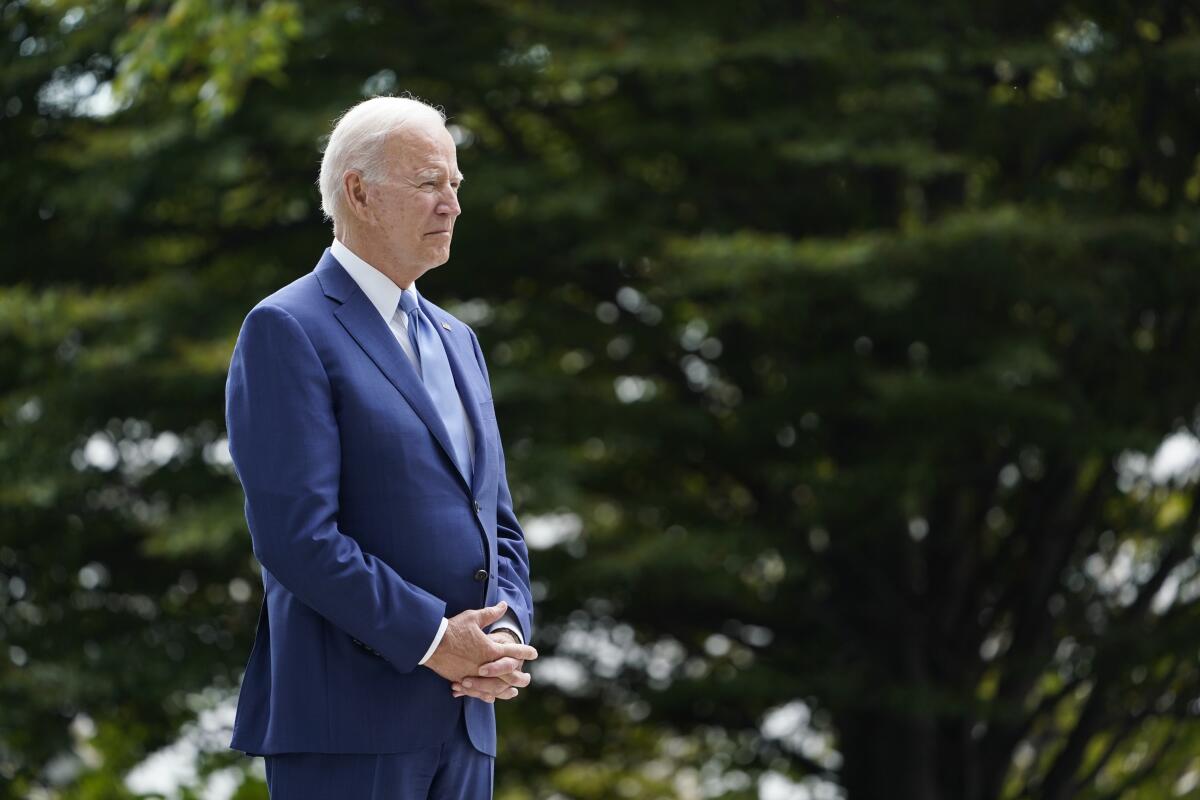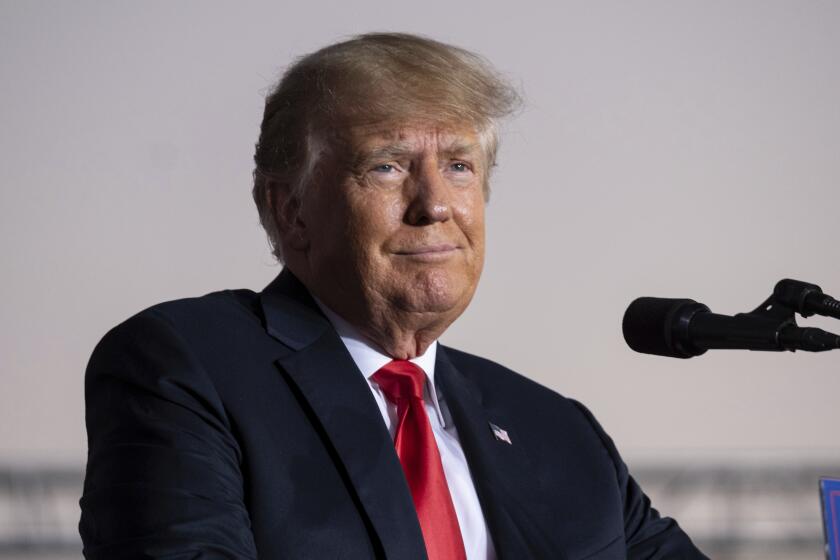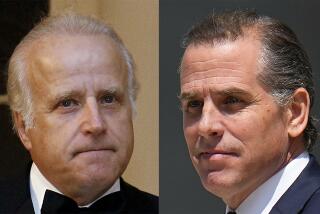Biden won’t invoke executive privilege to keep Trump Jan. 6 documents secret

- Share via
WASHINGTON — President Biden will not block a tranche of documents sought by a House committee’s investigation into the Jan. 6 insurrection at the U.S. Capitol, setting up a showdown with former President Trump, who has pledged to try to keep records from his time in the White House from being turned over to investigators.
In a letter to the Archivist of the United States, White House counsel Dana Remus wrote that Biden had determined that invoking executive privilege “is not in the best interests of the United States.” That came days after Trump lawyers, citing executive privilege, sought to block the testimony of former Trump officials to the House committee. On Friday, a lawyer for Stephen K. Bannon said the former White House aide won’t comply with the committee’s investigation because of Trump’s claim.
In August, the committee asked for a trove of records, including communication within the White House under Trump and information about planning and funding for rallies held in Washington. Among those events was a rally near the White House on Jan. 6 featuring remarks by Trump, who encouraged a crowd of thousands of his supporters before some of them stormed the Capitol.
In the letter, Remus writes that the documents reviewed “shed light on events within the White House on and about January 6 and bear on the Select Committee’s need to understand the facts underlying the most serious attack on the operations of the Federal Government since the Civil War.”
The Associated Press obtained a copy of the letter Friday, which was first reported by NBC News.
Copies of the documents responsive to the request were turned over to the Biden White House and Trump’s lawyers for review for potential executive privilege concerns in accordance with federal law and the executive order governing presidential records.
A report by the Senate Judiciary Committee’s Democratic majority details Donald Trump’s extraordinary effort to overturn the 2020 election he lost.
The committee’s 10-page request to the National Archives seeks “[a]ll documents and communications within the White House on January 6, 2021,” related to Trump’s close advisors and family members, the rally at the nearby Ellipse and Trump’s Twitter feed. It asks for his specific movements on that day and communications, if any, from the White House Situation Room. Also sought are all documents related to claims of election fraud, as well as Supreme Court decisions on the topic.
Biden’s decision affects only the initial batch of documents reviewed by the White House. Press Secretary Jen Psaki said subsequent determinations would be made on a case-by-case basis.
The sitting president has the final say, unless a court orders the National Archives to take a different action. Trump has not formally sought to invoke executive privilege over the documents, though that action is expected soon.
If Trump is able to block the release of the documents, it would mark a dramatic expansion of the unwritten executive power. But he will have an uphill battle, as courts have traditionally left questions of executive privilege up to the current White House occupant. Still, the former president’s challenges could delay the committee’s investigation.
Two windows and two doors used by Jan. 6 rioters were among only a few that weren’t reinforced during a Capitol security upgrade that started in 2017.
Two other witnesses subpoenaed by the panel, former White House Chief of Staff Mark Meadows and former Pentagon aide Kash Patel, are “engaging” with the committee, according to its Democratic chairman, Mississippi Rep. Bennie Thompson, and Republican vice chairwoman, Rep. Liz Cheney of Wyoming. Thompson and Cheney issued a statement Friday after a deadline for document production had passed.
“Though the Select Committee welcomes good faith engagement with witnesses seeking to cooperate with our investigation, we will not allow any witness to defy a lawful subpoena or attempt to run out the clock, and we will swiftly consider advancing a criminal contempt of Congress referral,” the two lawmakers said.
A spokesman for the panel declined to comment on the status of a fourth witness, former Trump communications aide Dan Scavino.
Bannon’s defiance sets the stage for a likely clash with the committee, which is rapidly issuing subpoenas to individuals who are either connected to Trump or who helped plan the Jan. 6 rally where he told his supporters to “fight like hell.”
Bannon’s refusal to comply, and Trump’s vow to litigate the testimony, will at the least delay the panel’s probe. But members of the committee, several of whom worked as prosecutors on Trump’s two impeachments, were prepared for that possibility and have repeatedly warned that they will charge uncooperative witnesses with contempt. Trump often successfully fought demands for testimony from his aides during his presidency, but may find his legal standing shakier now that he is out of office.
Charging witnesses with contempt would likely involve a vote of the full House and a referral to the Justice Department. It would then be up to Justice how to proceed with charges.
Sheriff Chad Bianco acknowledged he was a member of the Oath Keepers in 2014 but left after finding “the group did not offer me anything.”
Bannon’s lawyer, Robert Costello, said in a letter to the panel Thursday that, until the issues over privilege are resolved, “we are unable to respond to your requests for documents and testimony.”
Costello wrote that Bannon, a former aide to Trump who had contact with him during the week of the Capitol attack, is prepared to “comply with the directions of the courts” when and if they rule on the issue.
The letter included excerpts from another letter sent to Bannon by Justin Clark, a lawyer for Trump. Clark says documents and testimony provided to the Jan. 6 panel could include information that is “potentially protected from disclosure by executive and other privileges, including among others the presidential communications, deliberative process and attorney client privileges.”
Clark wrote to Bannon that “President Trump is prepared to defend these fundamental privileges in court.”
Spokespeople for Trump have not returned messages seeking comment. Trump said in a statement last month that he would “fight the Subpoenas on Executive Privilege and other grounds, for the good of our Country.”
Bannon is the only one of the top Trump aides subpoenaed on Sept. 23 who was not working for the Trump administration on Jan. 6. It is unclear whether that will affect his standing to claim executive privilege if the case moves to the courts.
Patel said in a statement that he will “continue to tell the American people the truth about January 6” but would not say whether he would comply. Scavino and an aide to Meadows have not immediately responded to requests for comment.
The issue can also become more complicated because Trump no longer is in office. As the former president, he cannot directly assert privilege to keep witnesses quiet or documents out of the hands of Congress. As the current president, Biden will have some say in the matter.
The Select Committee to Investigate the January 6th Attack has issued more than a dozen subpoenas to people linked to plans for the Jan. 6 protests, including three additional witnesses announced Thursday. Those witnesses would be less likely to get help from Trump’s executive privilege claims, since they did not work for the White House and most of them did not have regular contact with Trump.
Thompson, the committee’s chairman, said additional subpoenas had gone to Ali Abdul Akbar, also known as Ali Alexander, and Nathan Martin, as well as the organization “Stop the Steal,” to learn more about a rally that was planned on the Capitol grounds at the same time as the larger gathering on the National Mall. The committee earlier subpoenaed 11 other individuals connected to the planning of the larger rally.
Associated Press writers Jill Colvin, Ben Fox and Farnoush Amiri contributed to this report.
More to Read
Get the L.A. Times Politics newsletter
Deeply reported insights into legislation, politics and policy from Sacramento, Washington and beyond. In your inbox twice per week.
You may occasionally receive promotional content from the Los Angeles Times.












